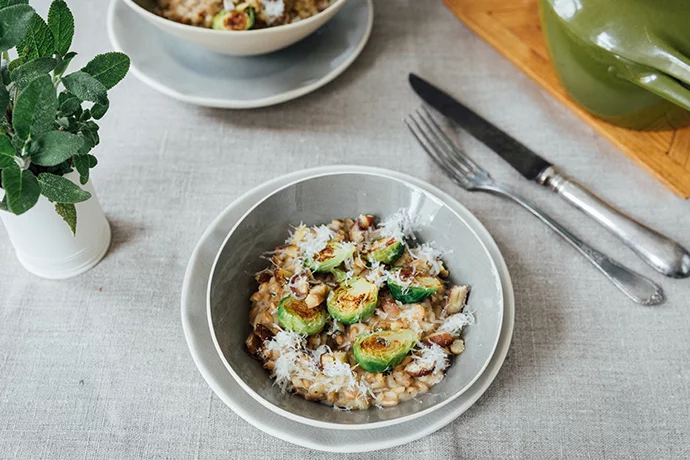

A risotto is a great meal to serve as a vegetarian or vegan option for special occasions. Brussels sprouts and chestnuts are easily available over the winter months in most supermarkets.
Health Benefits – Ingredients with anti-cancer effects
Prep: 20 Minutes | Cooking time: 20 Minutes | Servings: 4
Some of the rice in this risotto has been replaced with pearled spelt, a wholegrain with a highly prized nutty flavour. It contains dietary fibre which is good for gut health.
Chestnuts contain dietary fibre and polyphenols which are known to support the health of the gut microbiome.
Brussels sprouts belong to the family of cruciferous vegetables. Cruciferous vegetables contain a sulphur-containing phytochemical called glucosinolate, which is responsible for the distinctive smell and bitter flavour. Cooking and digestion break down glucosinolates into compounds called isothiocyanates that have been researched for their anti-cancer effects.
Ingredients
180g cooked, whole chestnuts roughly chopped
200ml of semi-skimmed milk (or plant milk if making this dish vegan)
2 tbsp olive oil
1 medium onion, finely chopped
250g risotto rice (arborio or carnaroli)
200g pearled spelt
125ml dry white wine (optional)
1.5l vegetable stock
5–10 fresh sage leaves, finely chopped
75g Parmesan cheese, grated, or non-dairy hard cheese for the vegan version of this recipe
200g Brussels sprouts, halved
2 springs of fresh thyme, leaves stripped from the stem
Method
- Put 100g of the cooked chestnuts in a saucepan with milk and bring to a simmer for 3 minutes.
- Remove from the heat and allow to cool a little before blending in a liquidiser to make a smooth chestnut purée. Set aside for later.
- Heat one tablespoon of oil in a large saucepan, add the onion and cook gently for a few minutes until the onion has softened but not coloured.
- Add the rice and pearled spelt to the saucepan and stir for a few minutes until the grains become coated in a little oil from the pan.
- Add the wine, if using, and continue to cook until it has evaporated.
- Begin adding the stock to the rice and spelt mixture, a ladleful at a time. (Reserve 50 ml of stock to cook the sprouts a little later).
- Continue to stir the risotto until all the stock is added and the rice and spelt grains are firm but not chalky when bitten into. This will take about 15 minutes. The spelt remains slightly chewy when cooked.
- Add the chestnut purée, half the cheese and half of the chopped sage leaves to the rice and spelt mixture and stir well.
- Add a little more stock to the risotto if required. It should be creamy and not too dry. Taste the risotto and adjust the seasoning if required.
For the brussels sprouts:
- Add the remaining 1 tbsp of olive oil to a non-stick frying pan together with the thyme leaves.
- Place the sprouts cut side down in the pan and cook until golden brown. Turn each sprout over and add the remaining stock.
- Cook the sprouts for another couple of minutes until they are cooked through.
- Add the remaining chopped cooked chestnuts, chopped sage leaves, Brussels sprouts and cheese to the risotto and serve.
Cooking Tips
To get ahead with this recipe prep up the ingredients in advance. Begin cooking the dish and stop half way through adding the stock to the rice and spelt before they are fully cooked. At this point turn off the heat. Brown the Brussels sprout halves and set on one side.
Twenty minutes before you are scheduled to eat, warm the remaining stock and continue to cook the risotto
Variation
Pearled barley can be used instead of pearled spelt. Tender stemmed broccoli could be used instead of Brussels sprouts. Garlic oil can be used instead of olive oil for added flavour.
| Per Serving (g) | Per 100 g | |
| Calories (kcal/KJ) | 618 / 2699 | 172 / 724 |
| Protein | 20 g | 5.5 g |
| Fat | 16 g | 4.5 g |
| Saturated fat | 5.7 g | 1.6 g |
| Carbohydrate | 88 g | 25 g |
| Sugar | 10 g | 2.8 g |
| Fiber | 2.6 g | 1.8 g |
| Sodium | 582 mg | 162 mg |
| Salt equivalent | 1.5 g | 0.41 g |
FODMAPs
The serving size of Brussels sprout in this recipe is low in FODMAPS 38g (Approximately 4 small) Brussels sprouts is low in FODMAPs. 75g (Approximately 7 small) is high in FODMAPs. The green tops of young leeks can be used instead of onion for a low FODMAP alternative,
Created on 01 Feb, 2022.
Print